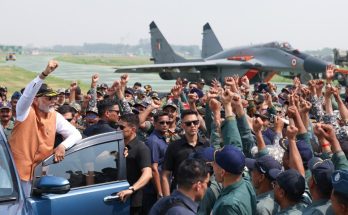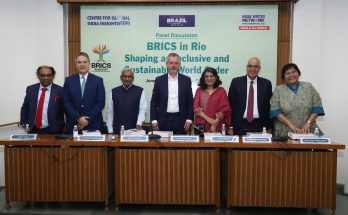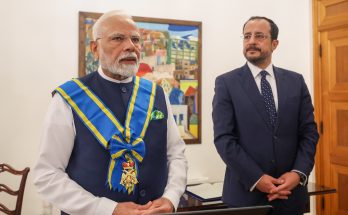
BALI: The G20 summit ended in the resort island of Bali with India taking over the G20 presidency amid ringing applause and stressing that it will forge “inclusive, ambitious, decisive, and action-oriented” agenda under its leadership of the twenty-nation grouping of the world’s richest and most powerful nations.
In many ways, the Bali summit was a high moment for India’s global leadership skills and a resonant reaffirmation of Prime Minister Modi’s growing global stature, with nearly all leaders of the world’s most powerful countries expressing support for India’s presidency of the grouping pivoted around hope and harmony in conflicted times.
At the end of the two-day summit on November 16, Indonesian President Joko Widodo symbolically handed over the G20 presidency to PM Modi at the closing session with world leaders applauding what India has billed as the presidency of hope and harmony. PM Modi looked jubilant as he took the baton and set the tone for India’s presidency by underlining that the world is looking at the “G-20 with hope”

“India is taking charge of the G-20 at a time when the world is simultaneously grappling with geopolitical tensions, economic slowdown, rising food and energy prices, and the long-term ill-effects of the pandemic,” he said at the closing session of the summit. “At such a time, the world is looking at the G-20 with hope. Today, I want to assure that India’s G-20 presidency will be inclusive, ambitious, decisive, and action-oriented,” he said.
Playing the role of the great reconciler amid spiralling tensions over the Ukraine war, PM Modi said: “Without peace and security, our future generations will not be able to take advantage of economic growth or technological innovation.” “The G-20 has to convey a strong message in favour of peace and harmony. All these priorities are fully embodied in the theme of India’s G-20 Chairmanship – “One Earth, One Family, One Future”.
“India played a key role in successful negotiations of the G20 Bali Declaration,” India’s Foreign Secretary Vinay Mohan Kwatara told reporters in Bali providing a broad overview of India’s role in shaping outcomes of the Bali summit. PM’s message that this is not the age of war and his exhortation to return to diplomacy and dialogue resonated with all delegations, said Mr Kwatra.
“The use or threat of use of nuclear weapons is inadmissible. The peaceful resolution of conflicts, efforts to address crises, as well as diplomacy and dialogue, are vital. Today’s era must not be of war,” said the G20 Bali Declaration issued at the end of the Bali summit.
Delicate Balancing on Ukraine
The emphasis on diplomacy and dialogue – a public position India has taken since the outbreak of the Russia-Ukraine war, and the incorporation of PM Modi’s oft-quoted one-liner to Russian President Vladimir Putin in Samarkand in the G20 Bali Declaration, vividly illustrate the triumph of India’s constructive consensus-based approach towards complex security issues.
The explicit mention of the Ukraine war and its impact on the global economy in the Bali Declaration was done in the teeth of Russia’s fierce opposition. Eventually after prolonged arguments, the joint statement was formulated, which demonstrated the importance of accommodating dissenting viewpoints in multilateral diplomacy and documents. The two paragraphs on the Russia-Ukraine war in the G20 Bali Declaration represented a delicate balancing act and can be cited as a textbook case of drafting diplomatic documents. “Recognizing that the G20 is not the forum to resolve security issues, we acknowledge that security issues can have significant consequences for the global economy,” said the joint statement.
Restoring Multilateralism
In the end, the Ukraine issue could not sink the G20 due to overwhelming collective impulse of the world’s richest economies for saving the grouping at a time of corroding global institutions such as then United Nations. Besides reconciling differences over Ukraine to ensure a consensus-based formulation, India also shape the formulations on climate finance, accelerating SDG, digital public goods and reform of global institutions.
India went out of its way to ensure that the Bali summit did not end without a joint declaration as the collapse of the Bali summit could have meant bad news for its presidency of the grouping that starts from December 1, 2022. Underscoring the role of the G20 in shaping a peaceful world, PM Modi stressed that the G20 will act as “a global prime mover to envision new ideas and accelerate collective action on pressing issues of the time ranging from food and energy security to reform of global governance institutions.”
Breathing New LiFE into G20
In his closing speech, PM Modi also highlighted his concept of eco-friendly lifestyle as a long-term solution to curbing global warming. “For the safe future of the planet, the sense of trusteeship is the solution. LiFE i.e. ‘Lifestyle for Environment’ campaign can make a big contribution to this. Its purpose is to make sustainable lifestyles a mass movement.”
PM Modi invited world leaders to visit India for the G20 summit New Delhi will host on September 9-10, 2023. “We wish that all of you will participate in this unique celebration in India, the ‘Mother of Democracy’. Together, we will make the G-20, a catalyst for global change,” said PM Modi. The support from world leaders for India’s presidency of G20 was overwhelming and was not only evident at the summit, but also in a record number of bilateral meetings and pull-asides PM Modi had with the leaders of 10 countries, including the US, Indonesia, UK, Germany, France, Spain, Italy, Australia and Singapore.
(
Manish Chand is CEO-Editor-in-Chief, India Writes Network, and India and The World magazine. He is Director, Centre for Global Insights India, a think tank focused on global affairs)
Author Profile

- Manish Chand is Founder-CEO and Editor-in-Chief of India Writes Network (www.indiawrites.org) and India and World, a pioneering magazine focused on international affairs. He is CEO/Director of TGII Media Private Limited, an India-based media, publishing, research and consultancy company.
Latest entries
 India and the WorldJune 16, 2025Amid Pakistan-Turkey nexus, Cyprus joins India against cross-border terror
India and the WorldJune 16, 2025Amid Pakistan-Turkey nexus, Cyprus joins India against cross-border terror India and the WorldMay 8, 2025Pahalgam payback: India exposes Pakistan’s lies, misuse of religious sites for training terrorists
India and the WorldMay 8, 2025Pahalgam payback: India exposes Pakistan’s lies, misuse of religious sites for training terrorists India and the WorldMay 3, 2025IMEEC provides a democratic alternative to BRI: Italy’s former foreign minister (Interview)
India and the WorldMay 3, 2025IMEEC provides a democratic alternative to BRI: Italy’s former foreign minister (Interview) India and the WorldApril 21, 20253T Template for India-US Mega Partnership
India and the WorldApril 21, 20253T Template for India-US Mega Partnership







